- 动态与公告
- 产品简介
- 购买指南
- 快速入门
- 平台功能介绍
- 代码接入指引
- 小程序开发指南
- 常见问题
- API 文档
- History
- Introduction
- API Category
- Making API Requests
- User Management APIs
- Team Management APIs
- Sensitive API-Related APIs
- Role Management APIs
- Platform Management APIs
- Other Console APIs
- Mini Program APIs
- DescribeMNPOfflinePackageURL
- CreateMNPDomainACL
- CreateMNP
- ReleaseMNPVersion
- CreateMNPApproval
- DescribeMNPAllStageVersions
- DeleteMNP
- DescribeMNP
- DescribeMNPList
- DescribeMNPCategory
- DescribeMNPPreview
- ModifyMNP
- ConfigureMNPPreview
- ProcessMNPApproval
- CreateMNPVersion
- DescribeMNPVersion
- DescribeMNPReleasedVersionHistory
- RemoveMNP
- RollbackMNPVersion
- Management-Sensitive APIs
- Global Domain Management APIs
- Application APIs
- Data Types
- 相关协议
- 动态与公告
- 产品简介
- 购买指南
- 快速入门
- 平台功能介绍
- 代码接入指引
- 小程序开发指南
- 常见问题
- API 文档
- History
- Introduction
- API Category
- Making API Requests
- User Management APIs
- Team Management APIs
- Sensitive API-Related APIs
- Role Management APIs
- Platform Management APIs
- Other Console APIs
- Mini Program APIs
- DescribeMNPOfflinePackageURL
- CreateMNPDomainACL
- CreateMNP
- ReleaseMNPVersion
- CreateMNPApproval
- DescribeMNPAllStageVersions
- DeleteMNP
- DescribeMNP
- DescribeMNPList
- DescribeMNPCategory
- DescribeMNPPreview
- ModifyMNP
- ConfigureMNPPreview
- ProcessMNPApproval
- CreateMNPVersion
- DescribeMNPVersion
- DescribeMNPReleasedVersionHistory
- RemoveMNP
- RollbackMNPVersion
- Management-Sensitive APIs
- Global Domain Management APIs
- Application APIs
- Data Types
- 相关协议
Flutter Plugin is a Flutter plugin to provide access for SDK in Flutter.
Add Flutter Plugin
Add the core plugin from Pub.dev
1. Add dependencyTo add plugin from pub.dev, open the pubspec.yaml file located inside the app folder, and add tcmpp_flutter: ${version} under dependencies.
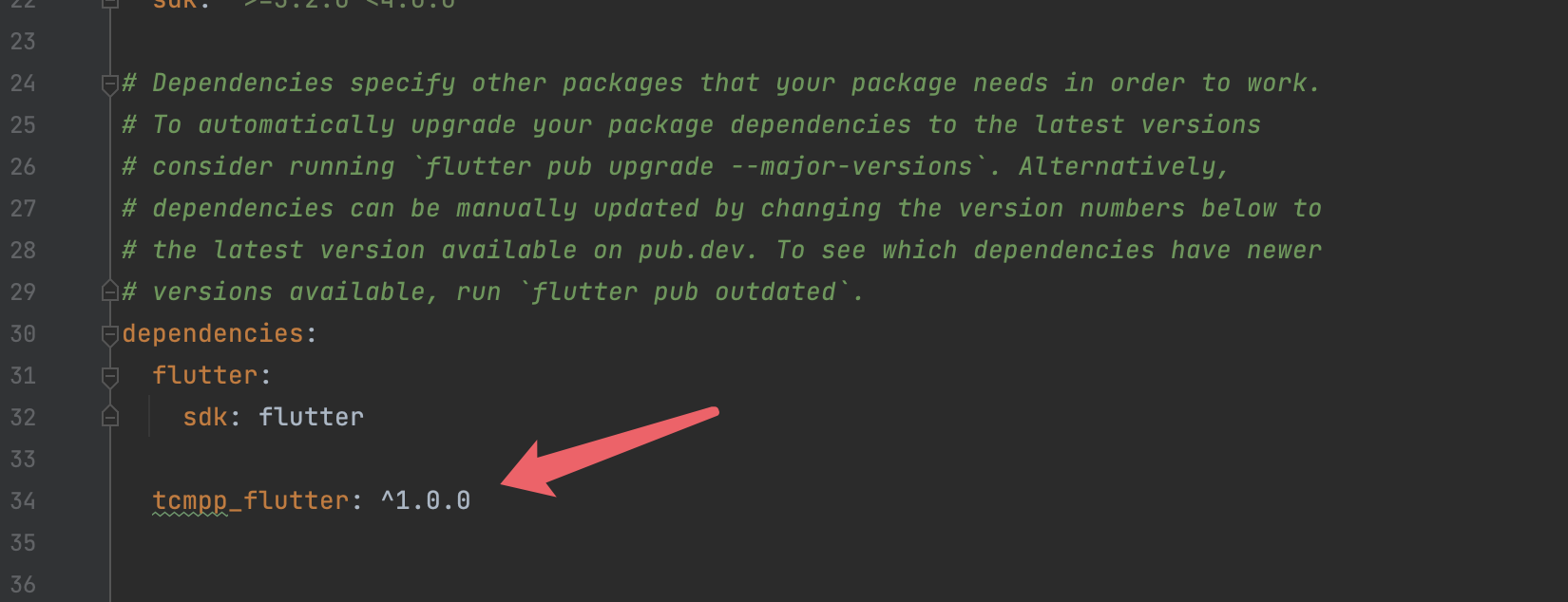
2. Install dependency
From the terminal: Run flutter pub get.
From VS Code: Click Get Packages located in right side of the action ribbon at the top of pubspec.yaml indicated by the Download icon.
From Android Studio/IntelliJ: Click Pub get in the action ribbon at the top of pubspec.yaml.
Add the extra plugins
Some mini-program APIs may require additional privacy and permissions. To use these APIs, additional Flutter plugin dependencies are needed.
APIs | Plugin name | Permissions needed |
LBS related APIs (Location & POI search) | Access location | |
MDNS APIs | Access locale network | |
TCP/UDP APIs | Access internet | |
Meida APIs (Photos & Videos) | Access photo library | |
Wifi APIs, Bluetooth APIs, Calendar APIs, Contact APIs, Clipboard APIs, Biometric authentication APIs | Access wifi state, Access bluetooth, Access Calendar, Access contact, Access clipboard, Access fingerprint & face id | |
Map APIs | Access location |
These plugins must be used together with tcmpp_flutter plugin. Map API support is only needed by Android platform, iOS include these APIs by default.
[Notice] iOS needs to add corresponding permission descriptions in the plist file:
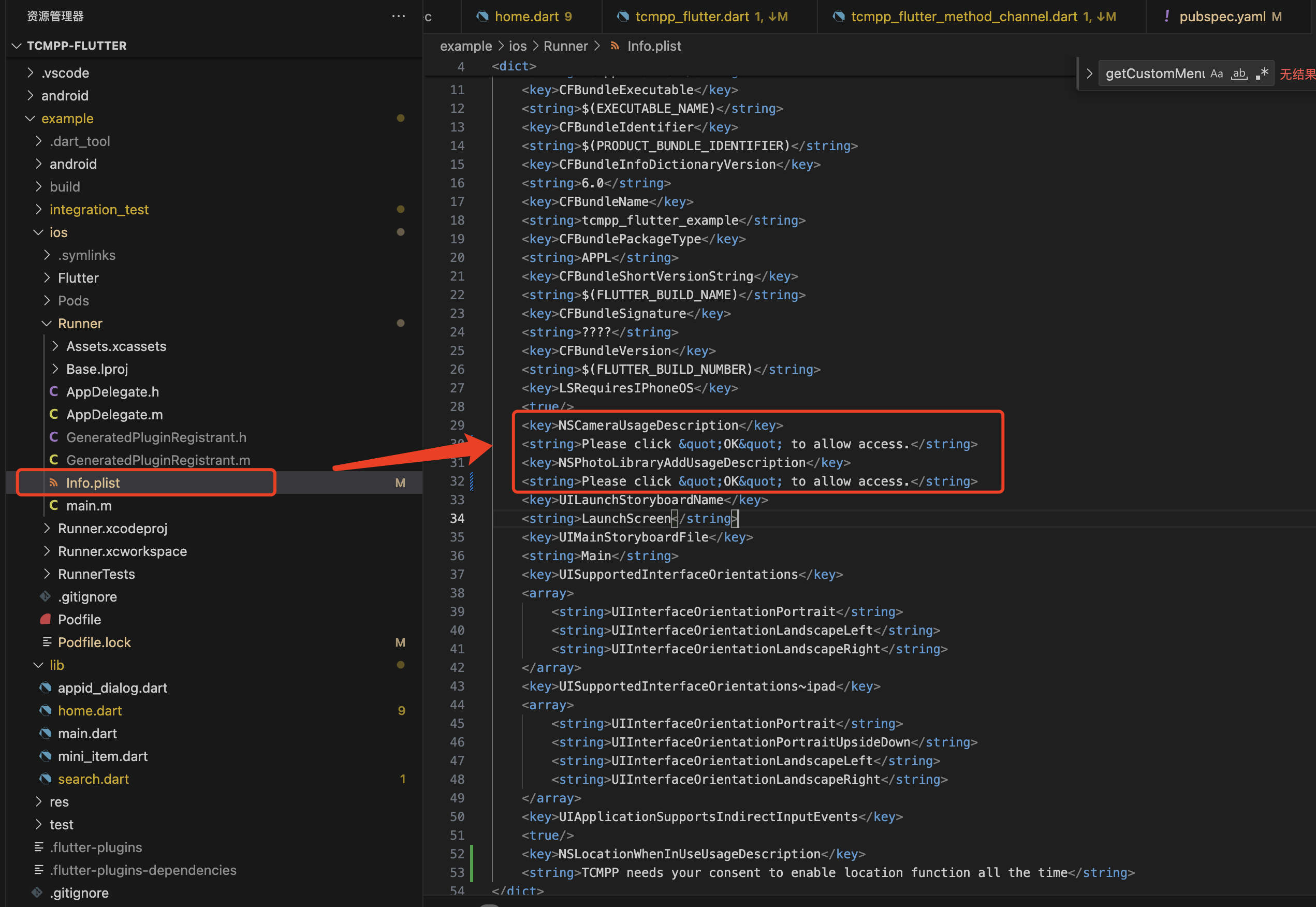
iOS plugin name and corresponding permission key:
Plugin name | Permission key |
tcmpp_flutter_lbs | NSLocationAlwaysUsageDescription
NSLocationWhenInUseUsageDescription NSLocationAlwaysAndWhenInUseUsageDescription NSLocationUsageDescription NSMotionUsageDescription |
tcmpp_flutter_mdns | NSBonjourServices |
tcmpp_flutter_network | NSAppTransportSecurity |
tcmpp_flutter_media | NSPhotoLibraryUsageDescription NSCameraUsageDescription |
tcmpp_flutter_device | NSCalendarsUsageDescription NSRemindersUsageDescription
NSContactsUsageDescription NSFaceIDUsageDescription NSBluetoothAlwaysUsageDescription NSBluetoothPeripheralUsageDescription |
Add assets for the configuration files
Get the configuration file from the product console
1. Get application ID / bundle ID of your Android / IOS application.
For Android, in your Flutter project, open android > app > build.gradle, application id can be found in android > defaultConfig section.
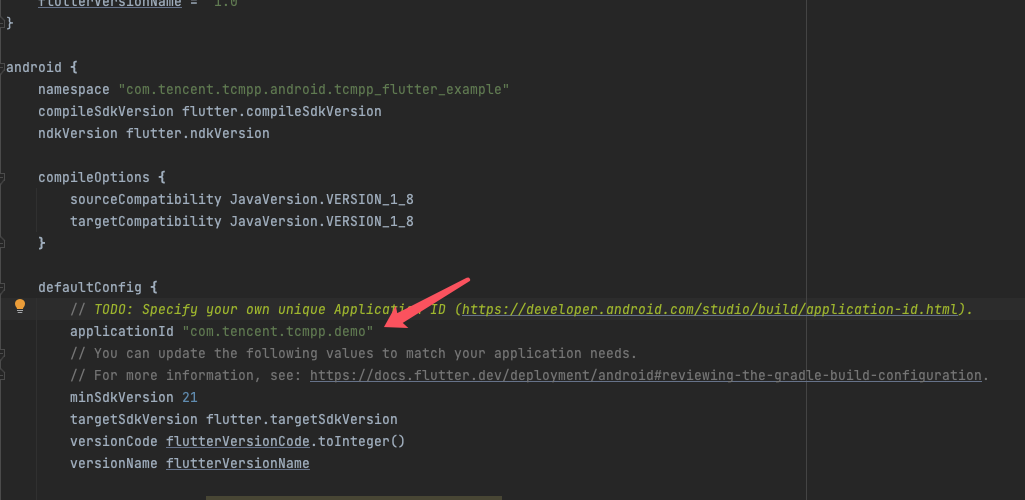
For IOS, in your Flutter project, open ios > Runner.xcodeproj > project.pbxproj, search for PRODUCT_BUNDLE_IDENTIFIER.
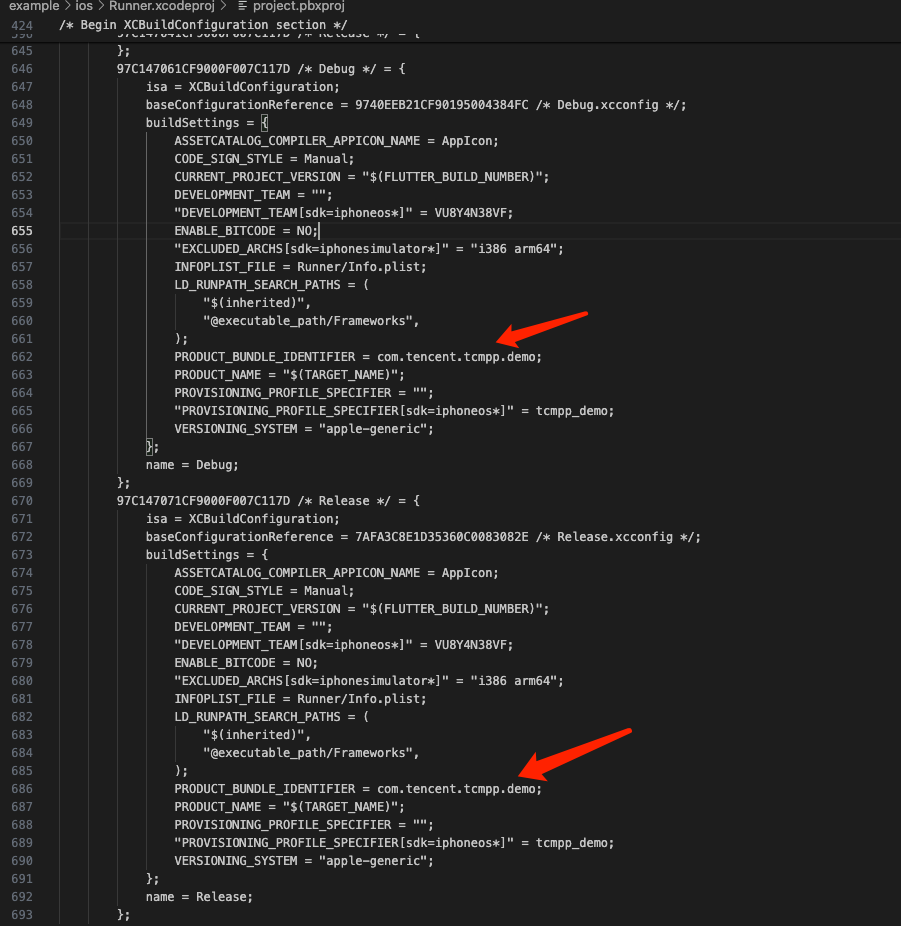
2. Create Flutter Application on the web console.
2.1 Login the Tencent Cloud Mini Program Platform Console and click 'Overview' in the left-hand navigation bar.
2.2 On the Overview page, click Access Application.
2.3 In the pop-up window for creating an application, fill in informations for your application.
2.4 For Intergration platform section, check both IOS platfrom & Android Platform. Then fill application ID / bundle ID you got in the package name field.
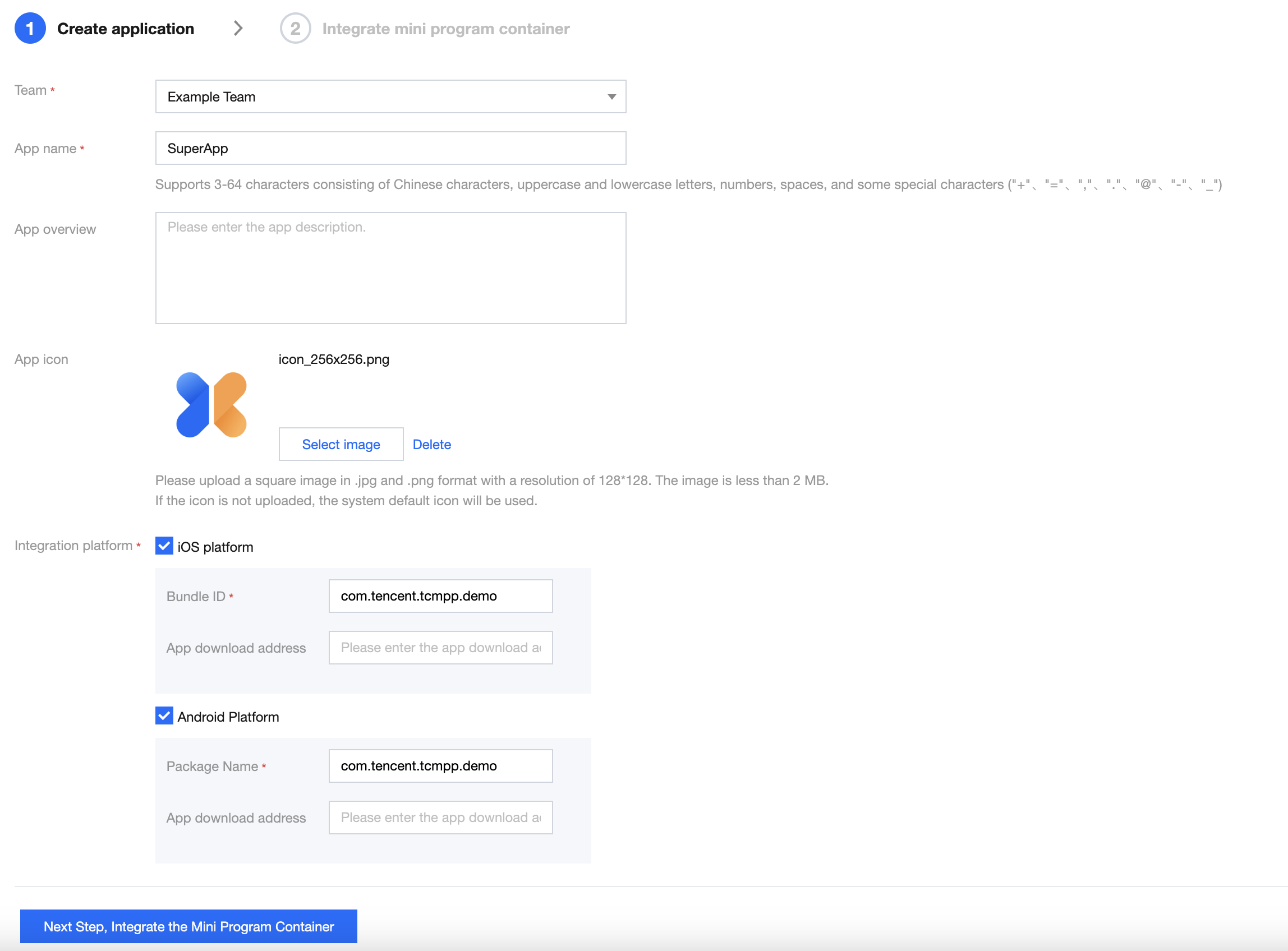
2.5 Click next, download Android / IOS configuration file in the new page.

Add configuration file
1. Put the configuration file someware in your flutter project.
2. Add a file named "tcmpp-plugin-settings.json" in your project's root.
3. Edit pubspec.yaml file and add flutter assets for files mentioned above.
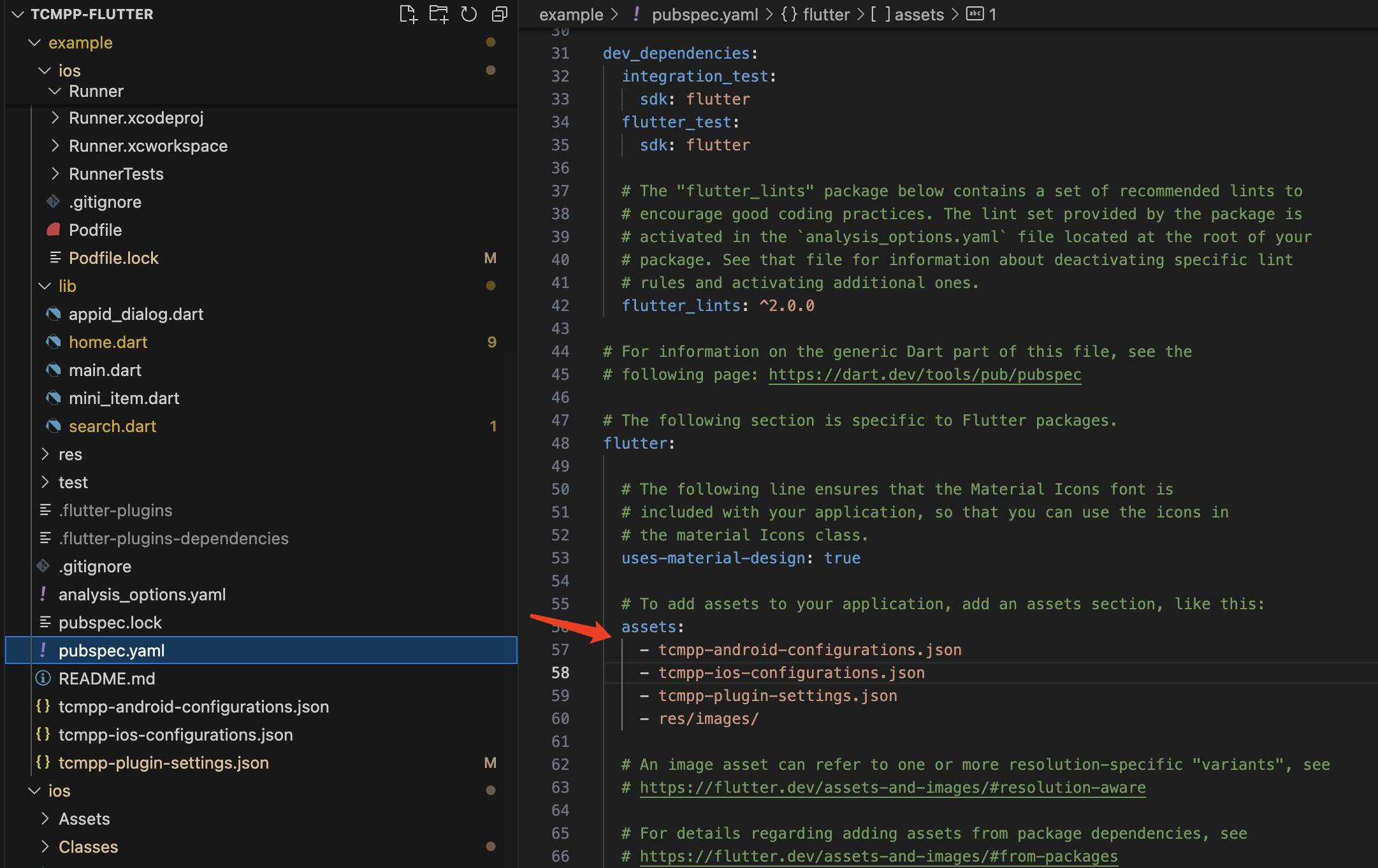
4. Specify the path to the configuration file in "tcmpp-plugin-settings.json".
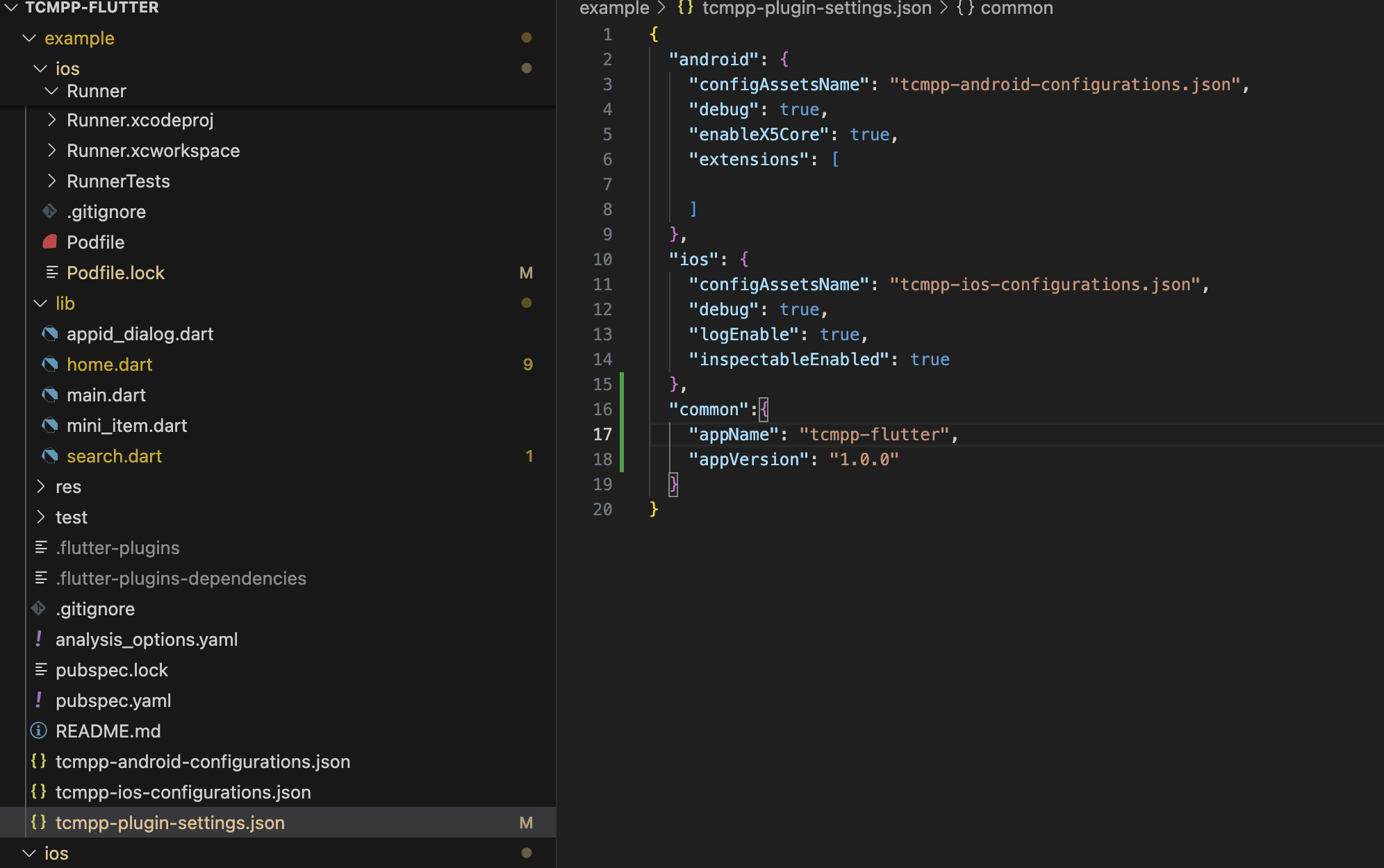
SDK settings
In the tcmpp-plugin-settings.json file, you can choose to configure settings of your SDK.
For Android:
Field name | Type | Description |
configAssetsName | string | Android configuration file path |
debug | bool | enable SDK debugging & log |
enableX5Core | bool | Whether to use TBS service(X5 core) as mini-program runtime |
x5LicenseKey | string | License for TBS service if runtime enabled |
X5DocLicenseKey | string | License for TBS document service if runtime enabled |
x5Core32Url | string | Download url for 32-bit TBS runtime |
x5Core64Url | string | Download url for 64-bit TBS runtime |
For iOS:
Field name | Type | Description |
configAssetsName | string | iOS configuration file path |
debug | bool | enable SDK debug |
logEnable | bool | enable SDK log |
inspectableEnabled | bool | Enable inspectable after iOS 16.4, you can debug mini-program through safari |
For common:
Field name | Type | Description |
appName | string | Host app name, mainly used for copyright prompts in mini-program |
appVersion | string | Host app version, mainly used for copyright prompts in mini-program |
Platform specific
For Android platform
1. Open android > app directory, edit build.gradle file.
2. In android > defaultConfig section, change minSdkVersion to no less than 21.
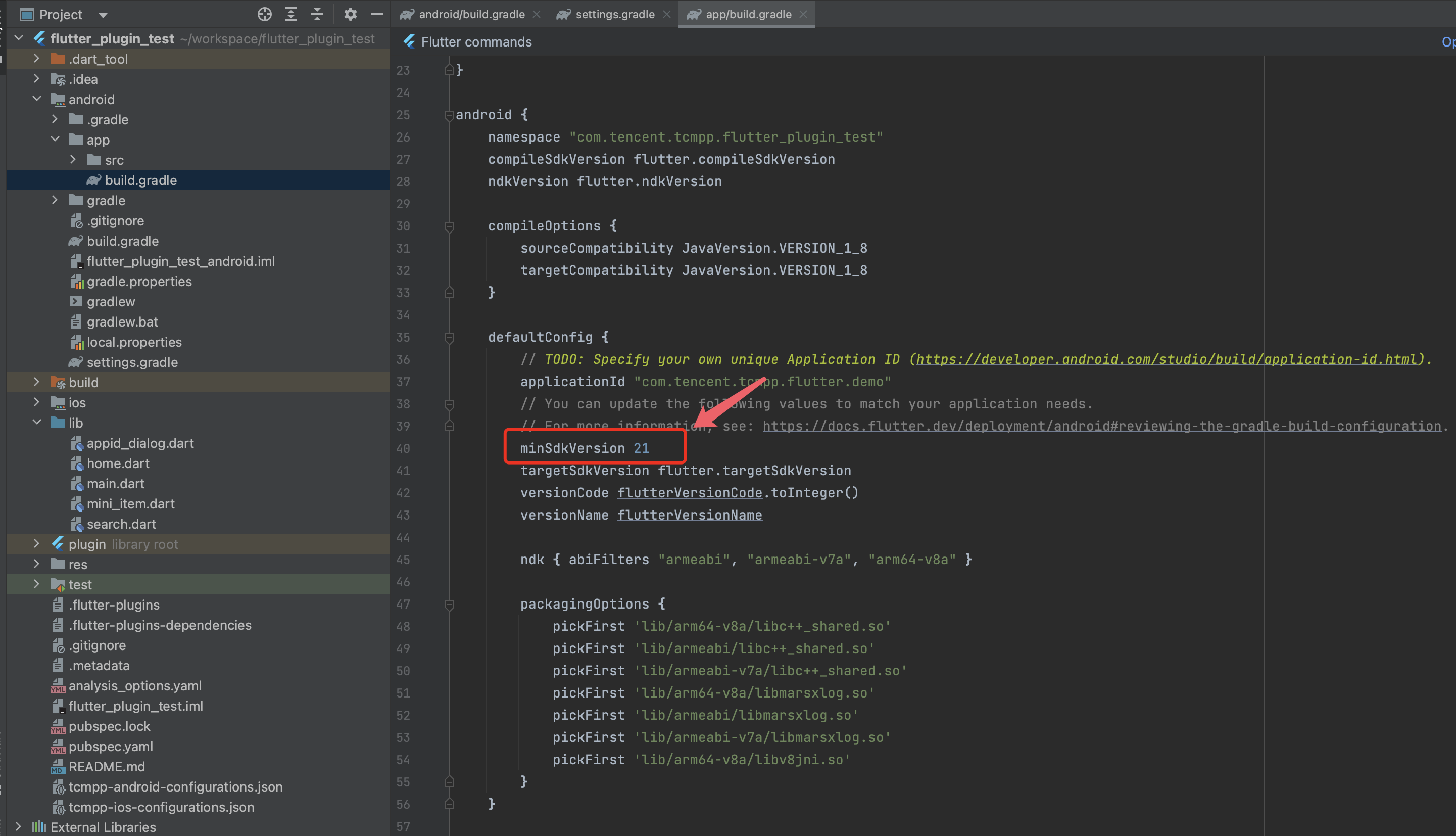
minSdkVersion 21
3. In android > defaultConfig section, add ndk filter for armeabi, armeabi-v7a, arm64-v8a.
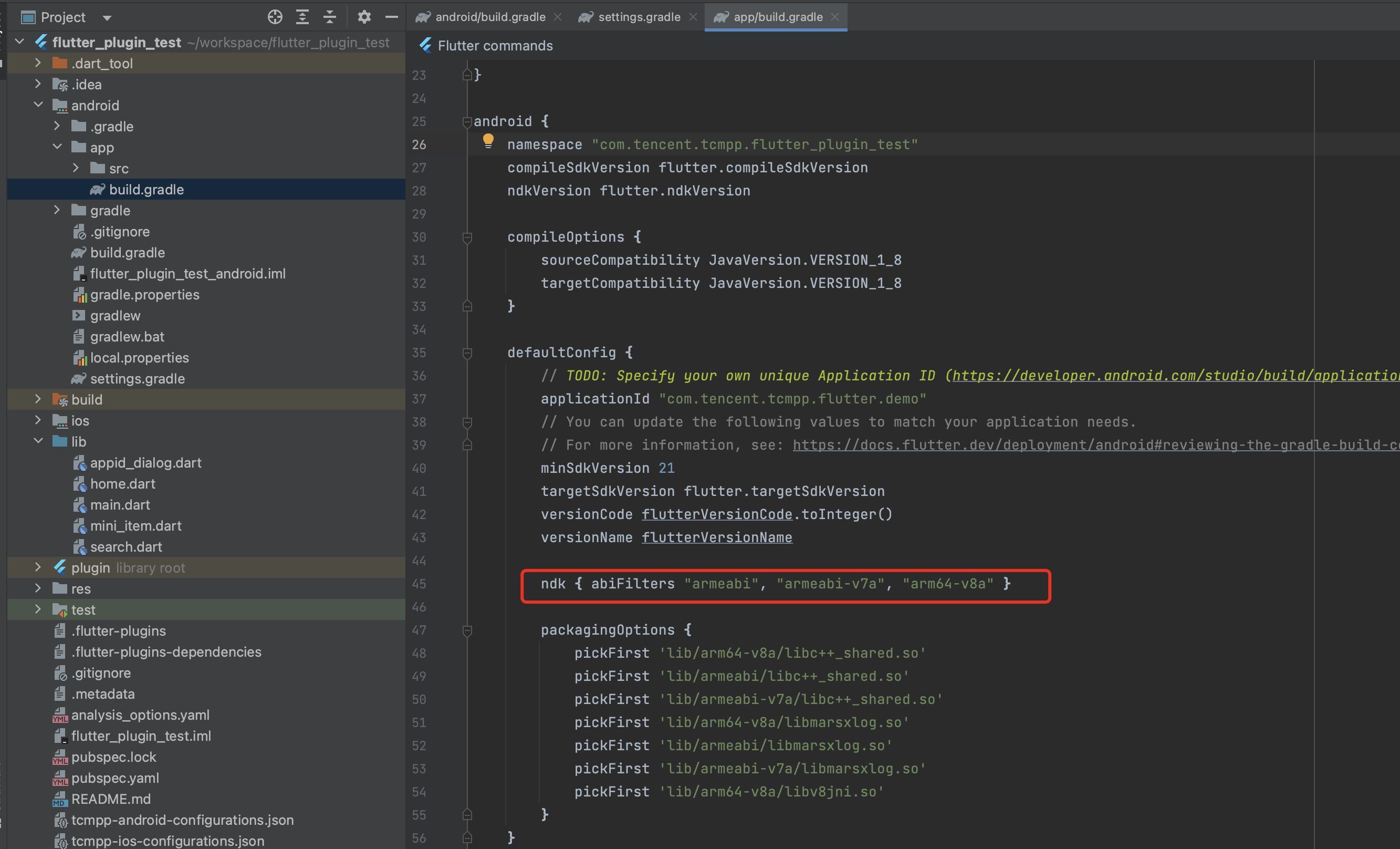
ndk { abiFilters "armeabi", "armeabi-v7a", "arm64-v8a" }
4. In android > defaultConfig section, add packagingOptions.
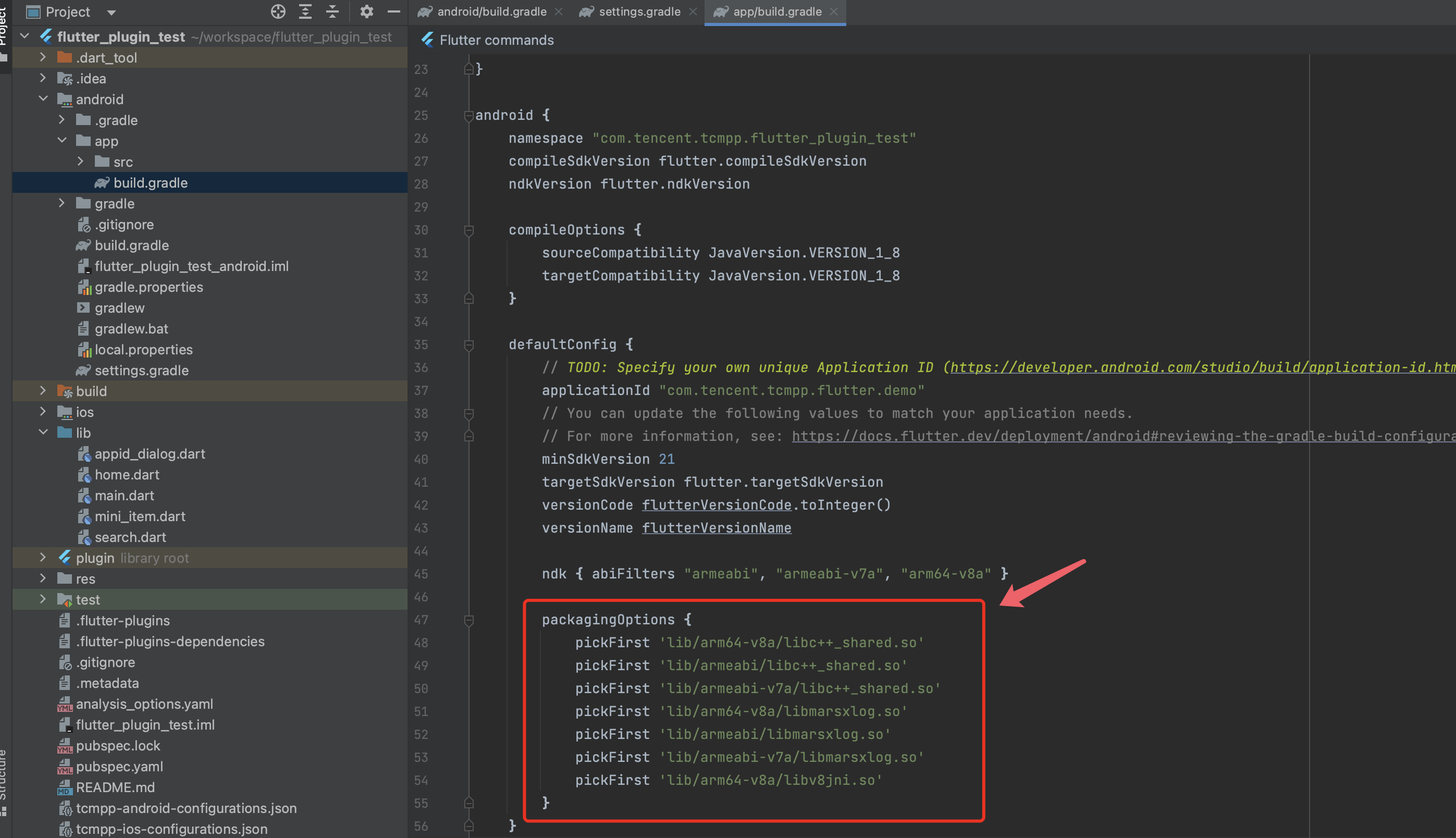
packagingOptions {pickFirst 'lib/arm64-v8a/libc++_shared.so'pickFirst 'lib/armeabi/libc++_shared.so'pickFirst 'lib/armeabi-v7a/libc++_shared.so'pickFirst 'lib/arm64-v8a/libmarsxlog.so'pickFirst 'lib/armeabi/libmarsxlog.so'pickFirst 'lib/armeabi-v7a/libmarsxlog.so'pickFirst 'lib/arm64-v8a/libv8jni.so'}
For iOS platform
Add source
In the Podfile file in the ios directory, add source:
source 'https://e.coding.net/tcmpp-work/tcmpp/tcmpp-repo.git'
Execute pod install
cd to ios directory,execute pod install:
pod install
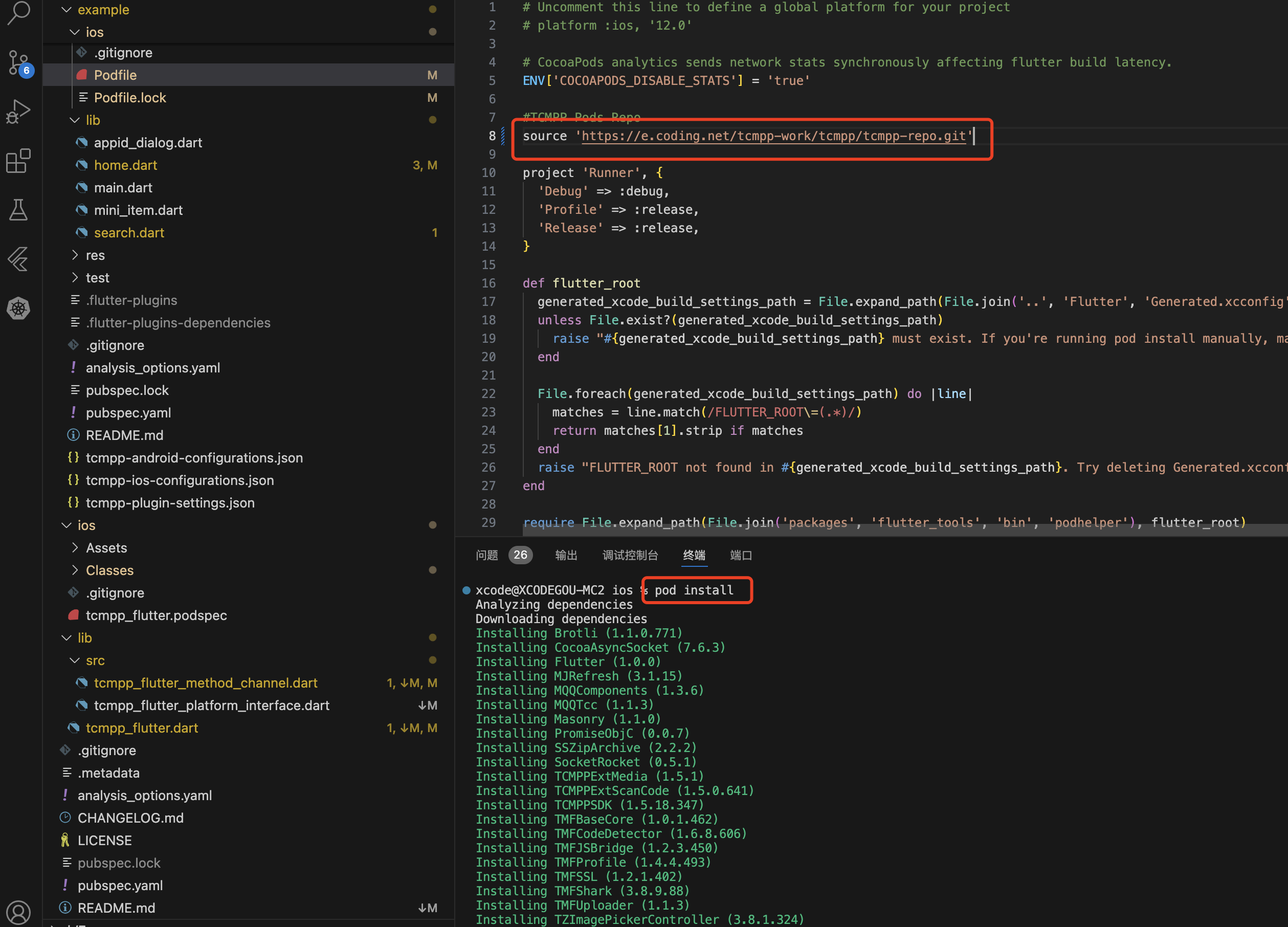
Flutter APIs
Usage
1. To use APIs, import 'package:tcmpp_flutter/tcmpp_flutter.dart'.
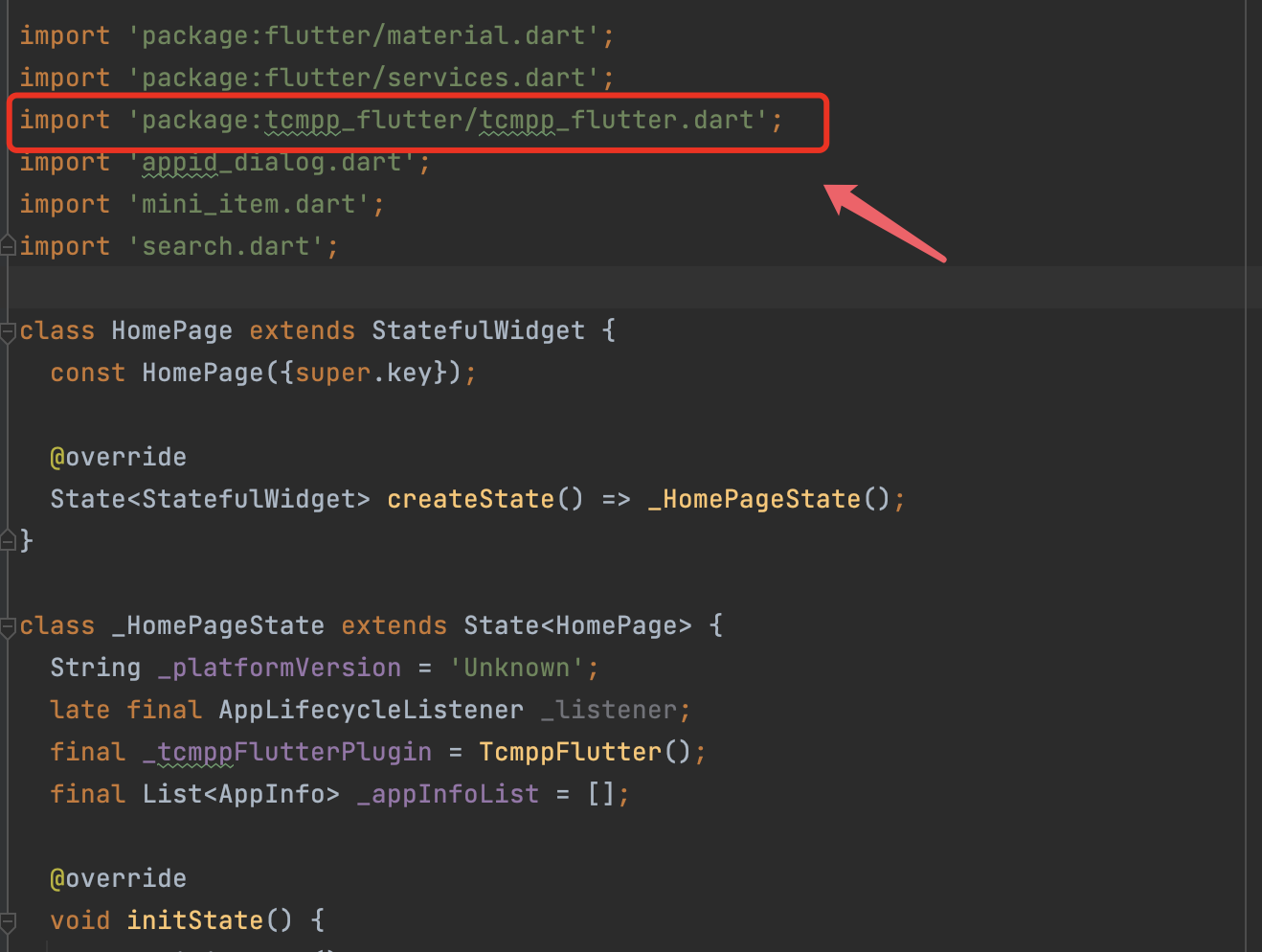
2. Then create a TcmppFlutter object and use it to call APIs.
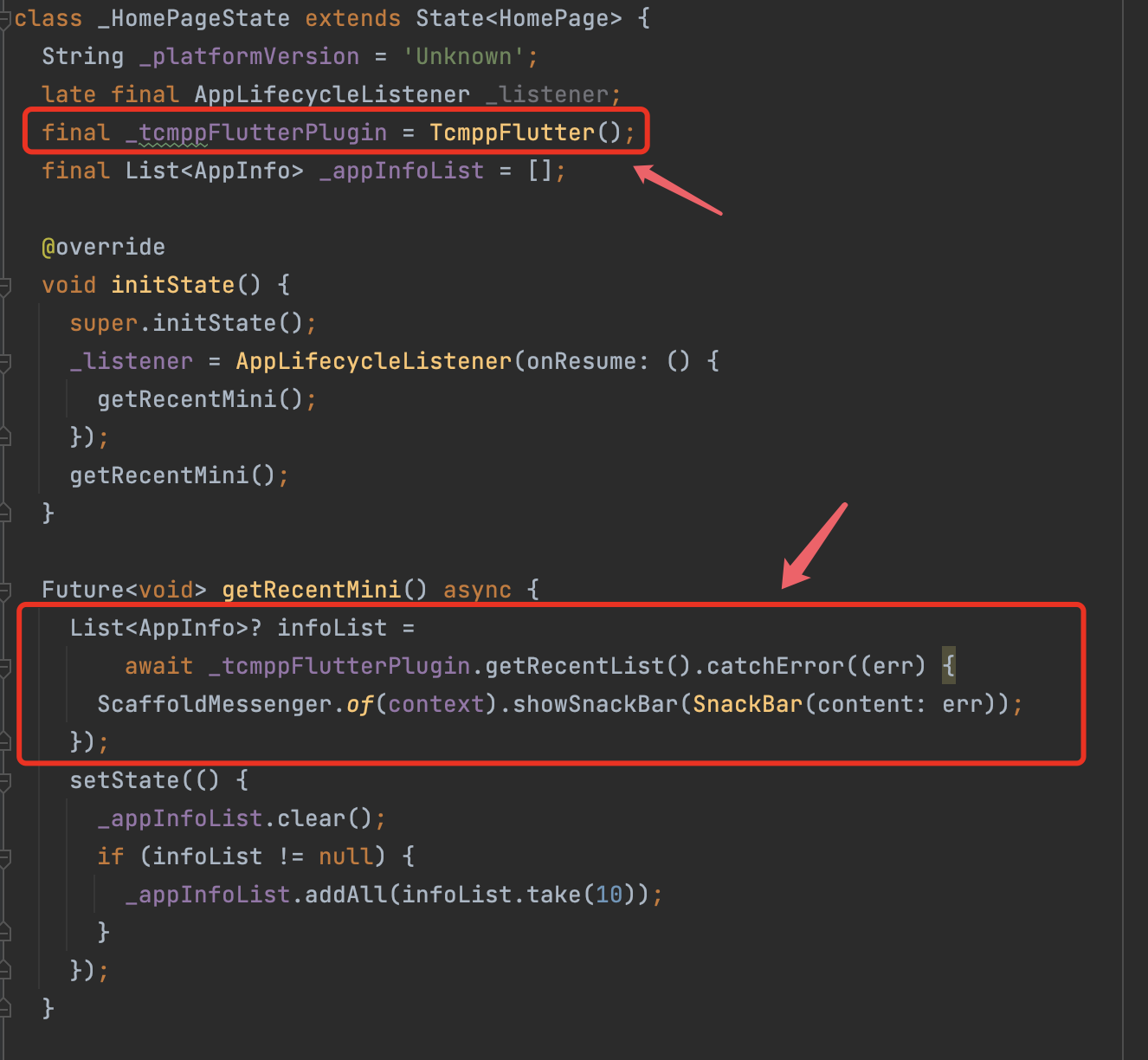
Implement Open APIs
Some mini-program APIs need to interact with host app or third-party library, such as get account information or request a payment action. For these APIs to work properly, developer should implement and register a OpenApiHandler before mini-program is launched. For details about these APIs, see OpenApiHandler in Classes section.
example code:
class MyAppletHandler extends OpenApiHandler {@overrideFuture<Map<String, dynamic>> getUserProfile(AppInfo appInfo, Map<Object?, Object?> params) async {print("getUserProfile:$appInfo params:$params");Map<String, dynamic> result = {"userInfo": {"nickName": "xcode","avatarUrl":"https://staticintl.cloudcachetci.com/cms/backend-cms/8WGP653_%E5%BC%80%E5%8F%91%E8%80%85%E5%B7%A5%E5%85%B7%E9%80%9A%E7%94%A8.png","gender": 1,"country": "China","province": "ChongQing","city": "ChongQing",}};return result;}@overrideFuture<Map<String, dynamic>> login(AppInfo appInfo, Map<Object?, Object?> params) async {/// return current login certification or do login if not logged in...}@overrideFuture<Map<String, dynamic>> checkSession(AppInfo appInfo, Map<Object?, Object?> params) async {/// throw any error if this api call is failedthrow NotLoggedInError();}/// other api implementation...}
The parameter of these API calls are provided by corresponding mini-program API, converted from JSON object into Dart Map object. Also return value of your implementation will be converted into JSON object and delivered to corresponding mini-program API. You can check out these APIs in the mini program API document.
To register your OpenApiHandler instance, use registerOpenApiHandler in TcmppFlutter object.
final _tcmppFlutterPlugin = TcmppFlutter();...@overridevoid initState() {super.initState();.../// Must registered before mini-program is launched_tcmppFlutterPlugin.registerOpenApiHandler(MyAppletHandler());}
Implement Custom API
The SDK engine provides an extension mechanism that allows the host app to customize APIs for mini-programs to call.
example code: /// Mini Program Callvar opts = {api_name: 'myApiName',success: function(res) {log(res);},fail: function(res) {log(res);},complete: function(res) {log(res);},data: {name : 'kka',age : 22}}wx.invokeNativePlugin(opts);
void initState() {super.initState();getRecentMini();/// Register custom JSAPI names and functions_tcmppFlutterPlugin.registerMiniAppApi("myApiName",myApiHandler);}/// Custom APIFuture<Map<String, dynamic>?> myApiHandler(MiniApiCall call) async {print("API : ${call.apiName}");print("AppInfo: ${call.appInfo}");print("WebView ID: ${call.webViewId}");print("params: ${call.params}");return {"result": "success","method":"myApiHandler"};}
Implementing platform event handler
Some platform events will be delivered to Flutter, you can register a handler to subscribe and response to those events.
example code:
class MyPlatformHandler extends TcmppPlatformEventHandler {@overrideFuture<void> onMiniProgramStateChange(String appId, MiniProgramState state) async {print("app state change: appid=$appId, state=$state");}/// other event handler implementation...}
final _tcmppFlutterPlugin = TcmppFlutter();...@overridevoid initState() {super.initState();.../// Must registered before mini-program is launched_tcmppFlutterPlugin.registerPlatformEventHandler(MyPlatformHandler());}
Implementing a custom menu
Developer can customize buttons in mini-program's action panel. Those include share buttons and other function buttons. Currently, action panel is called out by clicking the more button on top right side of mini-program.
example code:
@overrideFuture<List<CustomMenu>> getCustomMenus() async {/// The menu includes menuId, picture (supports local path and network picture), menu name, and whether it is a custom sharing type.CustomMenu menu1 = CustomMenu('100', 'res/images/mini_app_wechat_friend.png', 'Share To', true,shareKey: 'twitter');CustomMenu menu2 = CustomMenu('101', 'https://staticintl.cloudcachetci.com/cms/backend-cms/8WGP653_%E5%BC%80%E5%8F%91%E8%80%85%E5%B7%A5%E5%85%B7%E9%80%9A%E7%94%A8.png', 'Custom', false);return [menu1,menu2,];}
@overrideFuture<void> customMenuClick(String menuId, ShareData? shareMenu) async {/// callback for menu button clickprint("click menuId:$menuId shareMenu:$shareMenu");throw UnimplementedError();}
Mini-program state change event
When mini-program start, go foreground, go background and closed, host Flutter app can be notified by overriding onMiniProgramStateChange method.
example code:
@overrideFuture<void> onMiniProgramStateChange(String appId, MiniProgramState state) async {print("app state change: appid=$appId, state=$state");}
Log event
If important log message appears, it will also be delivered to host app. Override log method to record these messages.
example code:
@overrideFuture<void> log(String message) async {print(message);}
Analysis event
You can capture and record analysis events by implementing reportEvent method. These events including mini-program user interaction activities and crashes.
example code:
@overrideFuture<bool> reportEvent(int eventId, String eventName, AppInfo appInfo,Map<Object?, Object?> params) async {print("reportEvent:$eventName appinfo:$appInfo params:$params");// TODO: implement reportEventreturn Future.value(false);}
APIs
Future<void> startMiniAppWithId(String appId, MiniStartOptions? options)
Start a mini program with given appId
appId: The app id of mini program.
options: Start options of this mini program.
Future<void> startMiniAppWithLink(String link, MiniStartOptions? options)
Start a mini program with given link
link: The uri link to start.
options: Start options of this mini program.
Future<ScanResult?> scan()
Start a new page to scan for QR codes, returns a ScanResult if found one.
Future<List<AppInfo>?> getRecentList()
Get a list of recent opened mini programs
Future<List<AppInfo>?> searchMiniApp(String keyword,{int pageIndex = 0, int pageSize = 0})
Search for online mini programs with given keyword
keyWord: Keyword of mini program to search.
pageIndex: Page to return if pageSize has a none-zero value, which means paging is enabled.
pageSize: The max size of a page returned by server. When set to 0, paging will be disabled.
Future<void> stopMiniApp(String appId)
Stop mini program with given app ID
appId: The app id of mini program.
Future<void> stopAllMiniApp()
Stop all running mini programs
Future<void> deleteMiniAppCache(String appId,{int appVerType = 0, String? ver
Remove all local data of mini program with given ID
appId: the app id of mini program
appVerType: type of mini program
version: version of mini program to remove
Future<AppInfo?> currentMiniApp()
Return information for current foreground running mini program
Future<void> preDownloadMiniApp(List<String> appIdList,{bool isDownload = false})
Preload information for online mini programs
appIdList: a list of app IDs for mini programs to load.
isDownload: if set to true, mini program package will be downloaded after preload, default to false.
void registerOpenApiHandler(OpenApiHandler handler)
Register handler for sdk to send open api event to your flutter code. These events are triggered when mini-program require third-party information or action, such as, account login, request payment or get user information.
handler: method ref to handle open api event.
void registerPlatformEventHandler(TcmppPlatformEventHandler handler)
Register handler for sdk to send platform-related event to your flutter code.These events may query information about your flutter application or notify flutter when user interact with mini program container.
handler: method ref to handle platform event
void registerMiniAppApi(String apiName, TcmppMiniAppApiHandler apiHandler)
Define customised mini program api and associate api handler.apiName: name of your customised api, mini program can use this api by calling wx.(apiNme).
apiHandler: function to handle this api call
void setAccount(AccountInfo? info)
Set account information of current logged in user for data isolation and user information display
info: information of current logged in account, null if not logged in.
Future<void> setLocale(String language,{String? region, String? variant})
Set localization of mini-programs.must be set before mini-program launched.language: language of mini-programs. Should be an ISO 639 alpha-2 or alpha-3 language code.regin: region code of locale. Should be an ISO 3166 alpha-2 country code.variant: any arbitrary value used to indicate a variation of locale.
Future<void> setTheme(MiniTheme theme)
Set theme of mini-program container.must be set before mini-program launched.theme: light mode, dark mode or use system setting.
Classes
MiniStartOptions
class MiniStartOptions {/// entry path of mini programString? entryPath;/// is always update mini program when startbool? isForceUpdate;/// string param passed to mini program when startString? params;}
ScanResult
class ScanResult {/// result string of qrcode or barcode containsString? result;/// the type of codeString? scanType;/// charset of result stringString? charset;}
AppInfo
class AppInfo {/// MiniProgram idString appId;/// MiniProgram package type (release, dev, etc.). See [AppVerType]int appVerType;/// MiniProgram versionString version;/// MiniProgram nameString? name;/// MiniProgram icon urlString? iconUrl;/// MiniProgram descriptionString? appIntro;/// Developer of MiniProgramString? appDeveloper;/// MiniProgram release timeint time;}
AppVerType
/// Consts for MiniProgram package type. see[AppInfo]class AppVerType {static const int online = 0;static const int develop = 1;static const int preview = 2;static const int experience = 3;}
AccountInfo
class AccountInfo {/// Unique id of current accountString? uid;/// Url of avatar imageString? avatarUrl;/// Name of current accountString? accountName;}
OpenApiHandler
abstract class OpenApiHandler {/// Called when mini-program invoke wx.requestPayment, requesting third-party payment action///Future<Map<String, dynamic>> requestPayment(AppInfo appInfo, Map<Object?, Object?> params);/// Called when mini-program invoke wx.getUserProfile, requesting host app's user information///Future<Map<String, dynamic>> getUserProfile(AppInfo appInfo, Map<Object?, Object?> params);/// Called when mini-program invoke wx.login, requesting host app's login certificate///Future<Map<String, dynamic>> login(AppInfo appInfo, Map<Object?, Object?> params);/// Called when mini-program invoke wx.checkSession, requesting host app's login state/// check if login expired///Future<Map<String, dynamic>> checkSession(AppInfo appInfo, Map<Object?, Object?> params);/// Called when mini-program invoke wx.getUserInfo, deprecated by wx.getUserProfile/// compatibility for earlier mini-program api///Future<Map<String, dynamic>> getUserInfo(AppInfo appInfo, Map<Object?, Object?> params);/// Called when mini-program invoke wx.getPhoneNumber, get current user's phone number///Future<Map<String, dynamic>> getPhoneNumber(AppInfo appInfo, Map<Object?, Object?> params);}
TcmppPlatformEventHandler
abstract class TcmppPlatformEventHandler {Future<String> getAppName() async {return "";}Future<String> getAppVersion() async {return "";}Future<void> log(String message) async {}Future<List<CustomMenu>> getCustomMenus() async {return [];}Future<void> customMenuClick(String menuId, ShareData? shareMenu) async {}Future<void> onMiniProgramStateChange(String appId, MiniProgramState state) async {}Future<bool> reportEvent(int eventId, String eventName, AppInfo appInfo,Map<Object?, Object?> params) async {return false;}}

 是
是
 否
否
本页内容是否解决了您的问题?